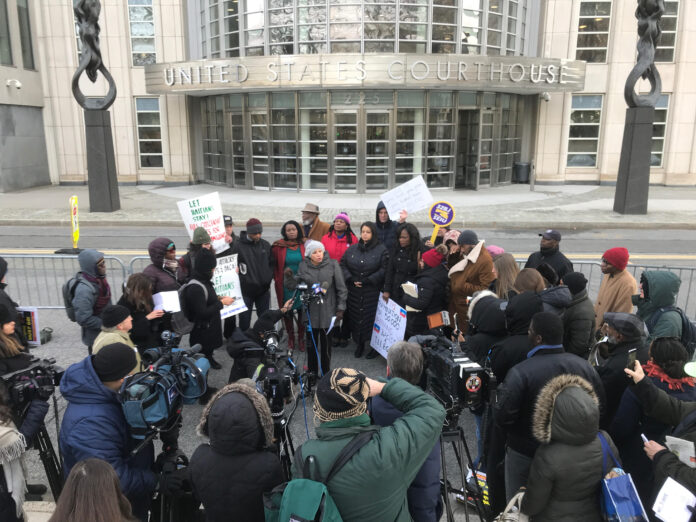
Some Haitians have been alarmed by the Sep. 14, 2020 appeals court opinion that a lower court wrongly blocked the Trump administration’s termination of TPS for Haiti, Nicaragua, El Salvador, and Sudan. But Haitians with TPS remain fully protected despite this opinion, including by a separate legal federal court ruling in their favor.
The Sep. 14 opinion of a three-judge panel of the Ninth Circuit Court of Appeals was in Ramos v. Nielsen, one of four separate federal court cases challenging Trump’s November 2017 termination of Haiti’s TPS designation. U.S. district judges in two of the cases — in Brooklyn and in San Francisco — had issued injunctions blocking the terminations. Haitians with TPS, no matter where they reside in the United States, remain fully protected by the Brooklyn-based judge’s decision last year in Saget v. Trump, which the government has appealed to the Second Circuit Court of Appeals.
Indeed, both the concurring and dissenting judges in Sep. 14’s Ramos opinion noted that Saget still fully protects Haitians with TPS. (It’s unknown when the Saget appeal may be decided.)
Saget provides Haitians granted TPS with independent protection no matter what may happen in Ramos
Meanwhile and importantly, the administration is expected to publish by Dec. 4, 2020 a new Federal Register Notice (FRN) — the Federal Register is the official publication of the U.S. government — which will extend to Sep. 4, 2021, automatically and by operation of law, the validity of the work permits and documents of all Haitians who currently have TPS. (Pursuant to an agreement in Ramos, the government has been periodically issuing such FRNs; the latest one, dated Nov. 4, 2019, extended the documents’ validity to Jan. 4, 2021. Employers and state DMVs must honor the FRN.)
And the legal process in Ramos isn’t finished. Oral arguments on appeal before three-judge panels were held in mid-2019 (Ramos) and June 2020 (Saget). (The Ramos appeal opinion came out 13 months after the oral argument. Its adverse 2-1 opinion was augured by hostile questioning by the Ninth Circuit panel, which included a Trump appointee.)
But the Ramos plaintiffs now have 45 days from Sep. 14 to request rehearing en banc, that is, to ask for a “redo” of the appeal before a larger panel of the Ninth Circuit’s 29 judges. If none of the 29 favors rehearing the case, the request would be denied a week later. But if any of the 29 judges wants the government to submit a brief in response to the request to rehear the case (which is likely), a due date for it will be given and further internal deliberations will occur, potentially taking many weeks or months. At the end of all that, a majority vote of the 29 judges will decide whether or not an 11 judge panel of the court will or will not rehear the case en banc.
In any case, the government has agreed that plaintiffs will be protected for an additional 120 days beyond issuance of the mandate following any adverse appellate ruling in Ramos, i.e. until at least about Mar. 5, 2021 even under the (unlikely) worst case scenario. If any judge wants to rehear the case, the weeks or months it will take the court to decide whether or not it wants to grant a rehearing will extend that date beyond Mar. 5 by that much time. And a decision to rehear the case en banc, which is quite possible, would extend the period of Ramos’ protection much longer. (Remember, importantly, that Saget provides Haitians granted TPS with independent protection no matter what may happen in Ramos.)
A government filing in another Haitian TPS case on Sep. 15 indicated that the government will also apply the 120 days of further protection to any adverse Saget decision. If that were to occur at any point in the future, plaintiffs attorneys would almost surely ask for rehearing en banc under the rules of the Second Circuit, which may be different from those of the Ninth Circuit regarding time periods.)
Whatever the eventual outcomes in Ramos and Saget, the attorneys in one or both cases may seek review by the U.S. Supreme Court (which might not grant it). A Biden administration would almost certainly protect the plaintiffs in both cases, which underscores the importance of the upcoming election!
In fact, internationally respected immigration lawyer Ira Kurzban and Haitian community activist Marleine Bastien co-wrote a Sep. 21 Miami Herald op-ed entitled “Voters in November, not courts, will decide the fate of Temporary Protected Status of Miami Haitians and others.”
In the piece, they argue that the Sep. 14 appeals court decision in favor of Trump “is only one step in a long legal battle; meanwhile, the fate of all those people will be decided by voters on Nov. 3, not by the current administration or by judges.”
“The candidates and their parties have presented stark alternatives,” Kurzban and Bastien note. “ President Trump has persistently kept his promise to dismantle TPS and send recipients to their home countries, and there is every reason to believe this steadfastness would continue under a second Trump Administration. Vice-President Joe Biden, on the other hand, has promised to protect TPS holders from being returned to unsafe countries and to work for a path to citizenship for long-term TPS holders through immigration reform.”
Florida will be a pivotal battleground state in the November election. The op-ed concludes: “The fate of TPS recipients — and of so much else — may lie in the hands of Florida voters… We remember that just 537 Florida votes in 2000 made the difference between President George Bush and a President Al Gore. President Trump and his allies know this as well and that is why they are working so hard to suppress the votes of people who support immigration reform.”
Steve Forester is the Immigration Policy Coordinator with the Institute for Justice and Democracy in Haiti (IJDH) but writes in his individual capacity.












